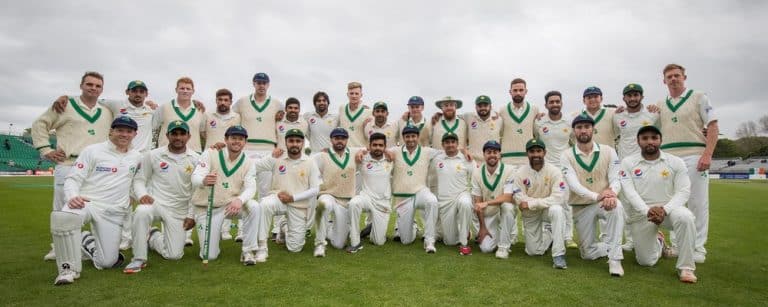
An interview with Irish cricket legend Ed Joyce shortly after his retirement.

Written in 2018
One of Ed Joyce’s favourite cricket snaps was taken shortly after the conclusion of Ireland’s first Test match at Malahide last month. It’s a team photo with a difference. Irish and Pakistani players stand arm in arm and just about everyone is smiling. The biggest smile of all belongs to the 39-year-old third from the left in the front row, clutching his souvenir stump.
“I love that picture,” says Joyce. “I liked the fact that the Pakistan team were the ones who were pushing for that photo even before the start of the game. It was a bit of a strange one. You wouldn’t want to do that too many times after losing a game. It was a weird feeling but it was appropriate after that game.
“I’m very happy that that was my last game for Ireland. I was thinking of stopping around last Christmas but having chatted to the coaches, I agreed to go to Zimbabwe and to be available for the Test match against Pakistan. I’m glad I did that because I loved playing the Test. It was a great occasion and a brilliant game of cricket. Obviously we came out on the losing side but I was really happy to get to that point and that was a great way for me to finish personally.”
Someone presented Joyce with a blown-up print of the photo and he has plans to get it framed at some stage. He’s just been a bit preoccupied recently. Starting work as a coach can have that effect, especially when you’ve been a professional player for the guts of two decades. What’s more, his new role with Cricket Ireland has a couple of strands to it. As well as his work as a batting coach, he will oversee leadership development in CI’s high-performance system.
“I guess it’s the obvious thing to do for someone who has really only ever done one job which is playing cricket,” Joyce says. “It makes sense to use that skill set and impart some of that knowledge to other people when you finished. I wanted to give it a go and see if I enjoyed it and if I was any good at it.
“I got a great opportunity to go with the Wolves to Bangladesh last year as part of the coaching team and enjoyed that. It was a tough tour for the lads but brilliant for them at the same time. I enjoyed that and wanted to keep going so part of the agreement this year was that after stopping playing, I’d dip my toe into that field.
“I’m passionate about the batting aspect of it. I didn’t necessarily want to go into coaching teams at this stage having played in teams for such a long time. I sort of want to get away from that and essentially do lots of one-on-ones, which I’ve already started.
“There is a leadership element to it as well which is very open-ended at the moment. There are two elements to it. It’s trying to identify captains in the various age groups for men and women and with the Wolves, and mentoring them a little bit - I can help with that given my captaincy experience at Sussex.
“We’ll also be looking at that growth element for every individual, to make them all leaders, make them more independent and less coach-led. I’ve sat down with (Wolves coach) Pete Johnston and (lead sports psychologist) Anne-Marie Kennedy to talk about how the program will work. We’re still figuring that out but it’s exciting.”
Given Joyce’s standing within the English county game, there were surely work opportunities for him there. But he was motivated to stay involved in the Irish game to help face the significant challenge of justifying Test status at a time when the make-up of the national team is in transition.
“I’m obviously passionate about Irish cricket,” he says. “We’ve done really well to be so competitive over the last decade, to build interest in the game and get more people playing cricket. It would be a shame if we couldn’t kick on now.
“We’ve been accepted as full members (of the ICC) and we’ve got a bit more funding but we still got to be very clever about how we use that money and how we deploy our resources generally because we have a very small playing pool here. It’s trying to make sure the talent that’s there gets the best chance of performing on the international stage.
“There’s an interprovincial element to that as well. It’s trying to make sure that the interpros are as competitive and as high a standard as possible, so that we have a smooth transition system for guys to progress into the national team.
“I’ll miss the feeling of being a player, especially of sitting in the dressing room with your team-mates after a win. But I’m much more excited about the new gig. I played for a very long time and I was definitely ready to stop and do something else. Now I want to get stuck in.”
Peter O'Reilly
June 2018